 ICRH Global Newsletter ICRH Global Newsletter 18th of December, 2015 |
| PROJECTS |
SH-CAPAC ICRH Belgium is partner in a newly approved EC-funded project on health related challenges of the currently arriving asylum seekers in EU.
The project is entitled ‘Supporting health coordination, assessments, planning, access to health care and capacity building in Member States under particular migratory pressure (SH-CAPAC)’. It aims to support EU-member states in the establishment of national and international health sector coordination mechanisms, in the analysis of health challenges and unmet health needs, the development of action plans, and in promoting and ensuring access of the refugee, asylum seekers and other migrants populations to health care and public health interventions. Furthermore, SH-CAPAC will build national capacity through training of trainers in affected countries who can implement training activities for health workers, so they can develop intercultural competences and have a clear understanding of a migrant sensitive health care delivery model, respecting human rights and dignity. The project consortium is coordinated by the Escuela Andaluza de Salud Pública (EASP – Spain) and has partners in Italy, Slovakia, Poland, Denmark, The Netherlands and Belgium. More information: Ines.keygnaert@ugent.be. |
INPAC Project Meeting and appointment ceremony 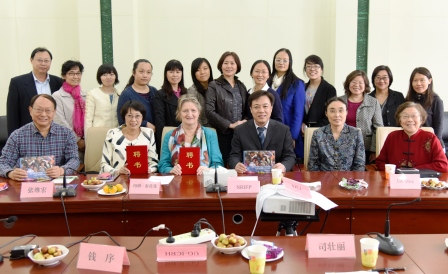 The INPAC project meeting was held on 25 October at the National Research Institute for Family Planning (NRIFP) in Beijing, China. The INPAC project meeting was held on 25 October at the National Research Institute for Family Planning (NRIFP) in Beijing, China.
Project Leader Wei-Hong Zhang’s presentation of the preliminary findings of the INPAC project was followed by an animated open discussion. Linked to this meeting, Marleen Temmerman, director of the department of Reproductive Health and Research, was appointed Honorary Professor and Wei-Hong Zhang (ICRH) was conferred the title of Adjunct Professor by the Research Centre for Social Medicine of NRIFP. Prof. Shangchun Wu of NRIFP chaired both the INPAC project meeting and the appointment ceremony. At the ceremony, Prof. Yuxiang Gu, the Deputy Director of NRIFP, introduced the structure and functions of NRIFP and the relevant activities organized by the Institute. Prof. Temmerman presented WHO’s global strategy for women’s children’s and adolescents’ health from 2016 to 2030.
|
Sexuality education in Uganda 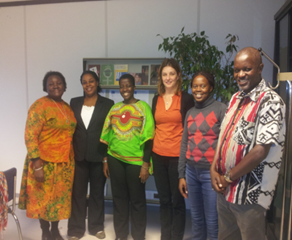 Launch of a project aimed at mitigating adverse sexual and reproductive health outcomes through a comprehensive primary school sexuality education program in South Western Uganda. Launch of a project aimed at mitigating adverse sexual and reproductive health outcomes through a comprehensive primary school sexuality education program in South Western Uganda.
This VLIR-OUS sponsored project is being implemented by ICRH (Ghent University), RHEA (Free University of Brussels), Mbarara and Uganda Martyrs Universities.
The launch meeting took place from 17 to 20 November in Gent and was attended by five Ugandan investigators including two PhD students, three Belgian investigators and a master´s student. The team discussed the key components of a Comprehensive Sexuality Education (CSE) curriculum for the pupils including the relevant topics suitable for the Ugandan context. The PhD students presented their PhD projects to the team: Elizabeth is working on implementation of CSE in schools with evaluation of process and outcomes and Anna is working on the enabling environment for CSE effectiveness with regard to policy framework/implementation, gender, and parental involvement. Sarah Pillen (master’s student at UGent) will use the project data for her thesis on evaluating gender distinction in SRH knowledge and attitudes. Furthermore, the project team had an opportunity to present project update to VLIR Uganda platform held in Brussels on 19th November.
The next steps are the administration of the baseline survey (April 2016) and the implementation of the CSE program in schools between June 2016 to May 2017. |
MOMI MOMI presentation at the MAGic 2015: Anthropology and Global Health Conference at the University of Sussex, United Kingdom
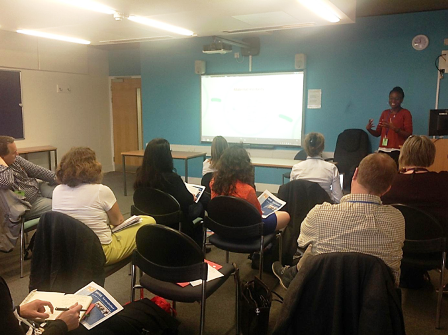 MOMI research staff, Emilomo Ogbe (ICRH- Belgium) gave a presentation on 'Translating maternal and child health policies into local interventions: Provision of postpartum care services in Sub-Saharan Africa, the missing link?' at the MAGic 2015: Anthropology and Global Health Conference which took place at the University of Sussex, Brighton from the 9th to 11th of September, 2015. The theme of the conference was 'Anthropology and Global health: Interrogating theory, policy and practice'. The audience included researchers, civil society organisations and medical practitioners working on topics related to anthropology and global health. MOMI research staff, Emilomo Ogbe (ICRH- Belgium) gave a presentation on 'Translating maternal and child health policies into local interventions: Provision of postpartum care services in Sub-Saharan Africa, the missing link?' at the MAGic 2015: Anthropology and Global Health Conference which took place at the University of Sussex, Brighton from the 9th to 11th of September, 2015. The theme of the conference was 'Anthropology and Global health: Interrogating theory, policy and practice'. The audience included researchers, civil society organisations and medical practitioners working on topics related to anthropology and global health.
MOMI at the Institute of Tropical Medicine Colloquium on 'Maternal and Neonatal Health beyond 2015’ in Rabat, Morocco.
MOMI Project Coordinator, Els Duysburgh gave a presentation on ‘Disrespectful maternal care in health facilities in four sub-Saharan African countries’ at the Institute of Tropical Medicine Colloquium on ‘Maternal and neonatal health beyond 2015’ in Rabat, Morocco from the 24th-27th of November, 2015. The Colloquium was focused on developing recommendations on how maternal health can be improved in an integrated post-2015 development framework, in line with the UN Global Strategy for Women’s, Children’s and Adolescents’ Health. Participants at the conference included researchers, health service providers and health policy makers.
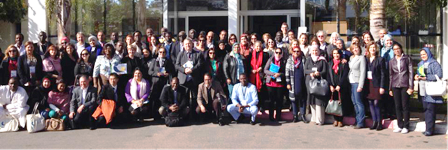 |
Female Genital Mutilation in Europe On 29 - 30 October the second face-to-face meeting of the FGM-PREV-project took place in Paris.
FGM-PREV is developing a new methodology to estimate the number of women and girls in Europe who have undergone female genital mutilation. To test this methodology a pilot study will take place in Italy and Belgium. During the meeting, the outline of the methodology was finalized as well as the questionnaire that will be used during the pilot study. The fieldwork will start in March 2016. The FGM-PREV-project is funded by the DAPHNE program of the European Commission and is conducted in collaboration with the Institut National d’Etudes Démographiques in Paris and The Department of Sociology of the Università degli Studi di Milano-Bicocca in Italy. More information: Els Leye, els.leye@ugent.be |
| EVENTS |
Expert consultation on inhuman or degrading treatment  ICRH professor Els Leye participated in an expert meeting that will inform the drafting of a new thematic report by prof. Juan E. Méndez, the United Nations Special Rapporteur on Torture and Other Cruel, Inhuman and Degrading Treatment or Punishment. ICRH professor Els Leye participated in an expert meeting that will inform the drafting of a new thematic report by prof. Juan E. Méndez, the United Nations Special Rapporteur on Torture and Other Cruel, Inhuman and Degrading Treatment or Punishment.
This consultation aimed to assist the Special Rapporteur in preparing his upcoming thematic report, which will focus primarily on the ways in which women, girl-children, and persons identifying as lesbian, gay, bisexual, transgender, and intersex (LGBTI), experience certain forms of harm, gender-based violence, and discrimination that do not fit within the traditional constructs of, but may in fact amount to torture or other ill-treatment. The report will examine how the legal framework on torture and other ill-treatment can be applied in a gender-sensitive manner to prevent, combat, and remedy serious violations of human rights suffered by women, girl-children, and LGBTI persons.
The consultation took place at the American University Washington College of Law (WCL) in Washington, DC, USA, on 5 and 6 November. The Special Rapporteur will present his report to the United Nations Human Rights Council in March 2016.
|
INPAC team members attending the Lancet-CAMS Health Summit 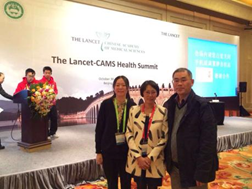 The Lancet and the Chinese Academy of Medical Sciences (CAMS) jointly organized the Lancet-CAMS Health Summit in Beijing on 30 and 31 October. October 30-31. The Lancet and the Chinese Academy of Medical Sciences (CAMS) jointly organized the Lancet-CAMS Health Summit in Beijing on 30 and 31 October. October 30-31.
About 400 participants from China, UK and other countries attended the mind-sharing summit. About 100 presentations selected from over 600 abstracts that were targeted China’s medical research were reported at the Summit. Two abstracts proposed by INPAC team members were accepted by the summit’s academic committee. ‘Induced abortion in 30 Chinese provinces in 2014: a cross-sectional survey’, a paper led by Shangchun Wu from National Research Institute for Family Planning was accepted for an oral presentation and was published in the Lancet-CAMS health summit abstract booklet. Another abstract, led by Yan Che from CMA-CSFP, was accepted for a poster presentation. On behalf of INPAC project, Wei-Hong Zhang introduced the progress of the project and the preliminary findings in a plenary session.
|
INPAC at the 8th EPH Conference 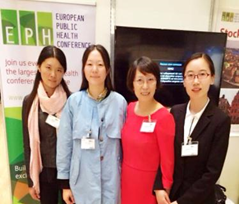 Three INPAC consortium partners presented posters and oral presentations at the 8th European Public Health (EPH) Conference that was held from October 14 to 17 in Milano Italy. Three INPAC consortium partners presented posters and oral presentations at the 8th European Public Health (EPH) Conference that was held from October 14 to 17 in Milano Italy.
The conference aimed to offer the opportunities of information updating and exchange on European and global public health area and was attended by more than 1,400 participants from over 50 coun-tries participated in the conference.
The INPAC project leader, Wei-hong, Zhang from UG-ICRH presented a walking poster entitled ‘the induced abortion is a problem of public health in China’. Professor Hong Jiang from FU introduced the research “Opportunities and systems requirements for developing post- abortion family planning in China” by poster walk. The master student Shasha Wang from Fudan University delivered an oral presentation on ‘the feasibility of short message reminder on post abortion contraceptive utilization in China –a pilot study’. The master student Yalan Liu from Chongqing Medical University displayed her poster on ‘Contraceptive practices among undergoing abortion: a multicenter observational study in West China’.
|
Zanzu: new website on sexual health  On 19 november, a new 13 languages website on sexual health was launched in Belgium. On 19 november, a new 13 languages website on sexual health was launched in Belgium.
Zanzu was created by the Flemish Expertise Centre for Sexual Health, and (Bundeszentrale für gesundheitliche Aufklärung), the German Federal Centre for Health Education. With this new website, they want to reach among others migrants and refugees.
The content on this website was approved by an international advisory board of European experts in the field of sexual and reproductive health including representatives of WHO. http://www.zanzu.be/en/home |
| ICRH PEOPLE |
PhD Peter Decat  On 28 September, Peter Decat defended his PhD thesis entitled ‘Addressing the Unmet Contraceptive Need of Adolescents and Unmarried youth: Act or Interact?Learning from Comprehensive Interventions in China and Latin America’. On 28 September, Peter Decat defended his PhD thesis entitled ‘Addressing the Unmet Contraceptive Need of Adolescents and Unmarried youth: Act or Interact?Learning from Comprehensive Interventions in China and Latin America’.
The thesis is based on the research that Peter did at ICRH from 2010 until 2014, within the framework of the EC-funded Cerca project (Community-embedded Reproductive health Care for Adolescents in Latin America).
Supervisors were prof. Olivier Degomme and prof. Kristien Michielsen. The full text can be downloaded HERE. |
PhD Caroline De Schacht 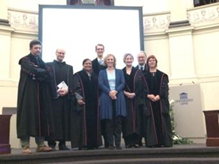 On 10 November, Caroline De Schacht defended her PhD thesis entitled ’Factors influencing mother-to-child transmission of HIV during pregnancy and breastfeeding in Mozambique'. On 10 November, Caroline De Schacht defended her PhD thesis entitled ’Factors influencing mother-to-child transmission of HIV during pregnancy and breastfeeding in Mozambique'.
Caroline’s research resulted in recommendations for measures to increase the uptake an retention of MCH/PMTCT services, aiming at a decreased vertical transmission of HIV.
Supervisors were prof. Marleen Temmerman and prof. Laura Guay. The full text can be downloaded HERE. |
PhD Howard Sobel  On 7 December, Howard Sobel defended his PhD thesis ‘Determinants of infant feeding practices and immunization status: a case study of the Philippines’. On 7 December, Howard Sobel defended his PhD thesis ‘Determinants of infant feeding practices and immunization status: a case study of the Philippines’.
Major findings of Howard’s research are among others that health workers’ practices contribute to dangerous interventions and missed opportunities, and that external and social influences have a direct effect on breastfeeding an immunization.
Prof. Marleen Temmerman was Howard’s supervisor. The full text can be downloaded HERE. |
Marleen Temmerman leaves WHO 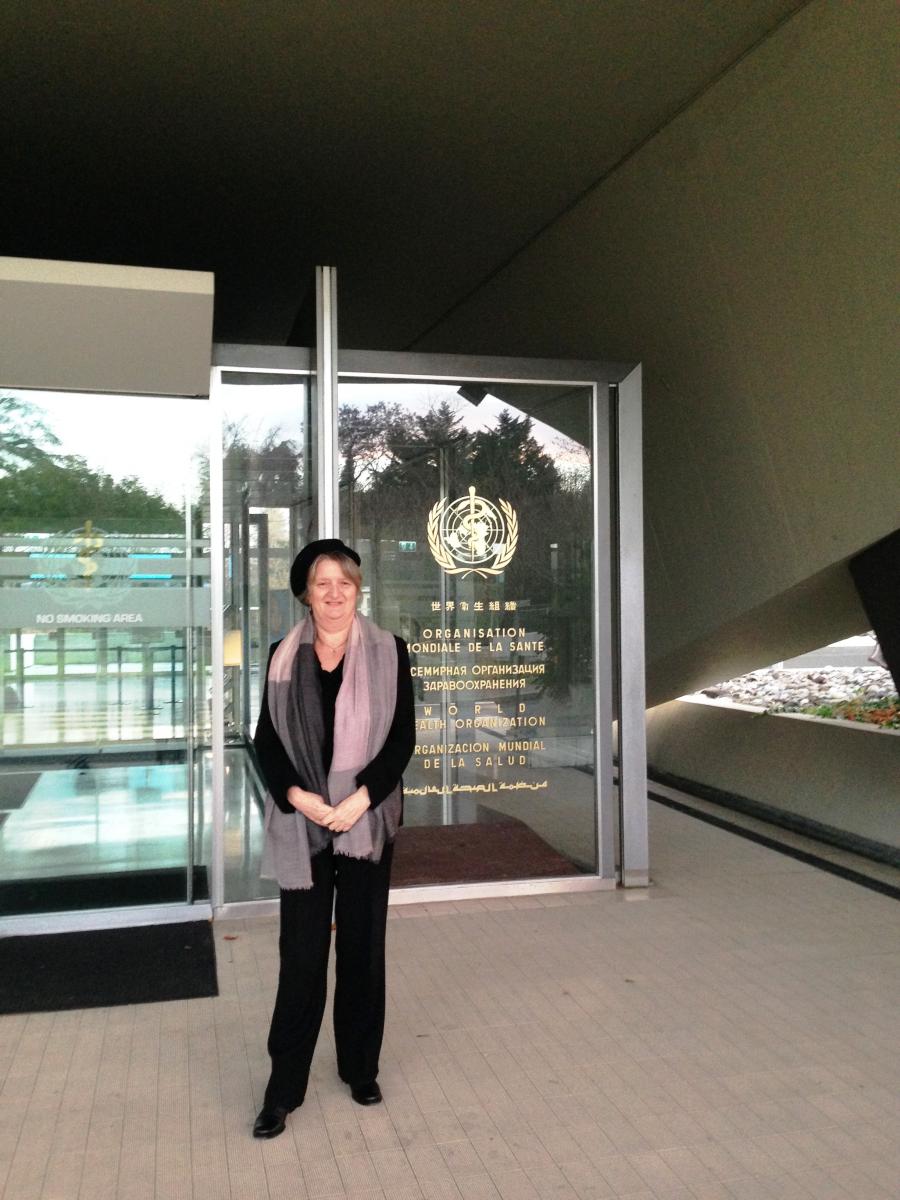 The founding mother of ICRH leaves WHO to become Chair of the Department of OB/GYN and Director of Women’s health East-Africa, Aga Khan University, based in Nairobi. The founding mother of ICRH leaves WHO to become Chair of the Department of OB/GYN and Director of Women’s health East-Africa, Aga Khan University, based in Nairobi.
Marleen established ICRH in 1994, immediately after the UN conference on Population and Development in Cairo. Under her leadership, ICRH became a well-known research institute and centre of excellence in the field of sexual and reproductive health and rights. In 2012, Marleen left Ghent to become the director of the Department of Reproductive Health and Research at the World Health Organisation (WHO) in Geneva. And now she is moving on to Kenya, to become Chair of the Department of OB/GYN and Director of Women’s Health East-Africa, Aga Khan University, based in Nairobi. She will lead research networks and programmes, and establish mentorship and research capacity building in collaboration with global and regional partners and stakeholders. Marleen will remain professor at Ghent University- with leave of absence- and will stay closely involved with ICRH and with the Faculty of Medicine and Health Sciences. She will among others continue to supervise PhD students, and establish links and partnerships for joint research and research capacity building. |
Wim Delva  ICRH professor Wim Delva completed his one-year sabbatical at the Swiss Federal Institute of Technology (ETH) in Zurich. ICRH professor Wim Delva completed his one-year sabbatical at the Swiss Federal Institute of Technology (ETH) in Zurich.
In collaboration with colleagues from the Zurich-based Theoretical Biology Group, the Computational Evolution Group in Basel and the University Hospital Zurich, he developed a research agenda for bridging the gap between HIV epidemiological inference with agent-based models and phylodynamic (molecular clock) models. The proposed work formed the basis for a postdoctoral research grant proposal, which was recently approved by the Research Foundation - Flanders (FWO). Besides brainstorming about a new conceptual framework for HIV epidemiology, the sabbatical also provided "protected time" to acquire and advance technical skills such as developing interactive apps, fitting computation-intense simulation models to data using Bayesian likelihood-free methods, and running simulations on a high performance computer grid. This sabbatical was in part funded by FWO and the National Research Foundation (NRF) of South Africa.
|
| PUBLICATIONS |
Care for victims of sexual violence  ICRH and CHU St Pierre developed a checklist and training set for optimal care of victims of sexual violence in Belgian Hospitals. ICRH and CHU St Pierre developed a checklist and training set for optimal care of victims of sexual violence in Belgian Hospitals.
Research on how victims of sexual and domestic violence are being cared for in Belgium has shown that many hospitals still lack protocols, that health care providers are insufficiently trained for recognising signals and caring for victims and that practices differ a lot all over Belgium. With funding from the Federal Agency of Public Health, and in the frame of the Belgian national action plan on violence, ICRH and CHU St Pierre developed a checklist for optimal care of victims of sexual violence in Belgian Hospitals. This checklist is evidence-based, takes current international guidelines on holistic care of victims into account, and is adapted to the Belgian context. The Belgian government is endorsing the implementation of the checklist and disseminates it to all Belgian hospitals. It’s available in Dutch and French. In addition we also developed a training set for training of trainers session on dealing with domestic and/or sexual violence in Belgian hospitals. It consists of a training manual and a ready-made power point presentation that has been tested and validated in many trainings with a broad range of hospital staff since 2009. This training set is designed for health care providers who already followed the in-depth courses on domestic violence organised by ICRH & CHU St Pierre, and is also available in Dutch and French. It can be obtained by sending a mail to ines.keygnaert@ugent.be . |
Contraception underuse Underlying causes and consequent undesired pregnancies in 35 low- and middle-income countries.
Every year, 87 million women worldwide become pregnant unintentionally because of the underuse of modern methods (MM) of contraception. Fifteen million out of 16.7 million undesired pregnancies occurring annually in 35 countries could have been prevented with the optimal use of MM of contraception.
Demographic and health surveys (DHS) of 35 countries, conducted between 2005 and 2012, were analysed. Contraceptive use of 12874 unintentionally pregnant women was compared with 111301 sexually active women who were neither pregnant nor desiring pregnancy.
An average of 96% of 15- to 49-year-old eligible women took part in the survey. When adjusted for covariates and compared with the use of MM of contraception, the use of traditional methods was associated with a 2.7 times increase in odds of an undesired pregnancy, while non-use of any method was associated with a 14.3 times increase. This corresponded to an estimated 16.7 million undesired pregnancies occurring annually in the 35 countries, of which 15.0 million could have been prevented with the optimal use of MM of contraception. Women with the lowest educational attainment and wealth quintile were 8.6 and 2.6 times less likely to use contraceptives compared with those with the highest level of each, respectively. Of the women who neither desired pregnancy nor used contraception, 37.3% cited fear of side effects and health concerns as the reason for non-use, 22.4% cited they or their partner's opposition to contraception or religious prohibition and 17.6% underestimated the risk of pregnancy.
Underuse of MM of contraception burdens especially the poor and the less educated. National strategies should address unfounded health concerns, fear of side effects, opposition and underestimated risk of pregnancy, which are major contributors to undesired pregnancies. Bellizzi S, Sobel HL, Obara H, Temmerman M. Underuse of modern methods of contraception: underlying causes and consequent undesired pregnancies in 35 low- and middle-income countries. Hum Reprod. (2015) 30(4): 973-86. |
Abuse in healthcare Experienced abuse in healthcare and associated obstetric characteristics in Europe in six European countries.
This study assessed the prevalence and current suffering of experienced abuse in healthcare and the association between abuse in healthcare and selected obstetric characteristics; in a setting of routine antenatal care in six European countries (6923 pregnant women in total).
One in five pregnant women attending routine antenatal care reported some lifetime abuse in healthcare. The prevalence varied significantly between the countries. Characteristics for women reporting abuse in healthcare included a significantly higher prevalence of other forms of abuse, economic hardship and negative life events as well as a lack of social support, symptoms of post-traumatic stress and depression. Among nulliparous women, abuse in healthcare was associated with fear of childbirth. For multiparous women only severe current suffering from abuse in healthcare was significantly associated with fear of childbirth. Current severe suffering from abuse in healthcare was significantly associated with the wish for caesarean section, and counselling for fear of childbirth for both nulli- and multiparous women.
Abuse in healthcare among women attending routine antenatal care is common and for women with severe current suffering from abuse in healthcare, this is associated with fear of childbirth and a wish for caesarean section. Lukasse M, Schroll AM, Karro H, Schei B, Steingrimsdottir T, Van Parys AS, Ryding EL, Tabor A; Bidens Study Group. Prevalence of experienced abuse in healthcare and associated obstetric characteristics in six European countries. Acta Obstet Gynecol Scand. (2015) 94(5): 508-17. |
HPV Vaccination Implementation of an HPV vaccination program in Eldoret, Kenya: results from a qualitative assessment by key stakeholders.
Cervical cancer strikes hard in low-resource regions yet primary prevention is still rare. Pilot projects have however showed that Human Papillomavirus (HPV) vaccination programs can attain high uptake. Nevertheless, a study accompanying a vaccination demonstration project in Eldoret, Kenya, revealed less encouraging outcomes: uptake during an initial phase targeting ten schools (i.e., 4000 eligible girls), was low and more schools had to be included to reach the proposed number of 3000 vaccinated girls. The previously conducted study also revealed that many mothers had not received promotional information which had to reach them through schools: teachers were sensitized by health staff and asked to invite students and parents for HPV vaccination in the referral hospital. This qualitative study, investigates factors that hampered promotion and vaccine uptake.
Focus group discussions (FGD) with teachers (4) and fathers (3) were organized to assess awareness and attitudes towards the vaccination program, cervical cancer and the HPV vaccine, as well as a FGD with the vaccinators (1) to discuss the course of the program and potential improvements. Discussions were recorded, transcribed, translated, and analyzed using thematic analysis In addition, a meeting with the program coordinator was set up to reflect upon the program and the results of the FGD, and to formulate recommendations for future programs.
Cervical cancer was poorly understood by fathers and teachers and mainly linked with nonconforming sexual behavior and modern lifestyle. Few had heard about the vaccination opportunity: feeling uncomfortable to discuss cervical cancer and not considering it as important had hampered information flow. Teachers requested more support from health staff to address unexpected questions from parents. Non-uptake was also the result of distrust towards new vaccines. Schools entering the program in the second phase reacted faster: they were better organized, e.g., in terms of transport, while the community was already more familiarized with the vaccine.
The authors conclude that close collaboration between teachers and health staff is crucial to obtain high HPV vaccine uptake among schoolgirls. Promotional messages should, besides providing correct information, tackle misbeliefs, address stigma and stress the priority to vaccinate all, regardless of lifestyle. Monitoring activities and continuous communication could allow for detection of rumors and unequal uptake in the community. Vermandere H, Naanyu V, Degomme O, Michielsen K. Implementation of an HPV vaccination program in Eldoret, Kenya: results from a qualitative assessment by key stakeholders. BMC Public Health. 2015 Sep 10;15(1):875. doi: 10.1186/s12889-015-2219-y. |
Equity in Health A study assessing inequity in expenditure on sexual and reproductive health (SRH) services in India and Kenya.
Using the data from the baseline situational analysis of the DIFFER project, our partner University College London, assessed the direct costs of seeking care and a range of socio-economic variables obtained through structured exit interviews with female SRH service users in Mysore (India) and Mombasa (Kenya). The results showed that spending on SRH services was highly regressive in both sites, with lower income households spending a higher percentage of their income on seeking care, compared to households with a higher income. The most common coping mechanisms in India and Kenya were "receiving [money] from partner or household members" (69 %) and "using own savings or regular income" (44 %), respectively. Highly regressive spending on SRH services highlights the heavier burden borne by the poorest when seeking care in resource-constrained settings such as India and Kenya. Access appears more difficult for those with weak social ties, small social networks or weak bargaining positions within the family - although this requires further study. Haghparast-Bidgoli H, Pulkki-Brännström AM, Lafort Y, Beksinska M, Rambally L, Roy A, Reza-Paul S, Ombidi W, Gichangi P, Skordis-Worrall J. Inequity in costs of seeking sexual and reproductive health services in India and Kenya. Int J Equity Health. 2015 Sep 15;14(1):84. |
Antenatal and childbirth care in rural health facilities An intervention study in rural health facilities in Burkina Faso, Ghana, and Tanzania.
In each country, 6 intervention and 6 non-intervention primary healthcare facilities, located in one intervention and one non-intervention rural districts, were selected. Quality was assessed in each facility by health facility surveys, direct observation of antenatal and childbirth care, exit interviews, and reviews of patient records and maternal and child health registers. Findings of pre- and post-intervention and of intervention and non-intervention health facility quality assessments were analysed and assessed for significant (p<0.05) quality of care differences.
Post-intervention quality scores do not show a clear difference to pre-intervention scores and scores at non-intervention facilities. Only a few variables had a statistically significant better post-intervention quality score and when this is the case this is mostly observed in only one study-arm, being pre-/post intervention or intervention/non-intervention. Post-intervention care shows similar deficiencies in quality of antenatal and childbirth care and in detection, prevention, and management of obstetric complications as at baseline and non-intervention study facilities.
The intervention study did not show a significant improvement in quality of care during the study period. However, the use of new technology seems acceptable and feasible in rural primary healthcare facilities in resource-constrained settings, creating the opportunity to use this technology to improve quality of care. Duysburgh E, Temmerman M, Yé M, Williams A, Massawe S, Williams J, Mpembeni R, Loukanova S, Haefeli WE, Blank A. Quality of antenatal and childbirth care in rural health facilities in Burkina Faso, Ghana, and Tanzania: an intervention study. Trop Med Int Health. 2015 Oct 26. doi: 10.1111/tmi.12627. [Epub ahead of print] |
Antenatal care and vulnerable groups A descriptive study on expectations and satisfaction with antenatal care among pregnant women with a focus on vulnerable groups in Ghent, Belgium.
Previous studies demonstrate that people’s satisfaction with healthcare influences their further use of that healthcare system. This study aims to analyse both expectations and satisfaction with antenatal care among pregnant women, with a particular focus on vulnerable groups.
A quantitative descriptive study was conducted in 155 women seeking antenatal care at the Univer-sity Hospital of Ghent (Belgium), of whom 139 completed the questionnaire.
Women had high expectations relating to continuity of care and women-centred care, while expec-tations regarding availability of other services and complete care were low. Significantly lower ex-pectations were observed among women without higher education, with low income, younger than 26 years and women who reported intimate partner violence. General satisfaction with ante-natal care was high. Women were satisfied with their relationship with the healthcare worker, however ; they evaluated the information received during the consultation and the organizational aspects of antenatal care as less satisfactory.
The authors conclude that in order to improve satisfaction with antenatal care, organizational as-pects of antenatal care (e.g. reducing waiting times and increasing accessibility) need to be im-proved. In addition, women would appreciate a better provision of information during consultation. More research is needed for an in-depth understanding of the determinants of satisfaction and the relationship with low socio economic status (SES). Anna Galle, An-Sofie Van Parys, Kristien Roelens and Ines Keygnaert. Expectations and satisfaction with antenatal care among pregnant women with a focus on vulnerable groups: a descriptive study in Ghent. BMC Women's Health 2015, 15:112 doi:10.1186/s12905-015-0266-2 |
Shelter from the storm On 3 December, UNFPA has launched its ‘State of the World Population’ report, entitled ‘Shelter-From The Storm’.
The report focuses on sexual and reproductive health of women and girls in the context of humanitarian crises. The full text can be downloaded at http://www.unfpa.org/swop. |
|
 ICRH Global Newsletter
ICRH Global Newsletter  Launch of a project aimed at mitigating adverse sexual and reproductive health outcomes through a comprehensive primary school sexuality education program in South Western Uganda.
Launch of a project aimed at mitigating adverse sexual and reproductive health outcomes through a comprehensive primary school sexuality education program in South Western Uganda.

 The INPAC project meeting was held on 25 October at the National Research Institute for Family Planning (NRIFP) in Beijing, China.
The INPAC project meeting was held on 25 October at the National Research Institute for Family Planning (NRIFP) in Beijing, China. MOMI research staff, Emilomo Ogbe (ICRH- Belgium) gave a presentation on 'Translating maternal and child health policies into local interventions: Provision of postpartum care services in Sub-Saharan Africa, the missing link?' at the MAGic 2015: Anthropology and Global Health Conference which took place at the University of Sussex, Brighton from the 9th to 11th of September, 2015. The theme of the conference was 'Anthropology and Global health: Interrogating theory, policy and practice'. The audience included researchers, civil society organisations and medical practitioners working on topics related to anthropology and global health.
MOMI research staff, Emilomo Ogbe (ICRH- Belgium) gave a presentation on 'Translating maternal and child health policies into local interventions: Provision of postpartum care services in Sub-Saharan Africa, the missing link?' at the MAGic 2015: Anthropology and Global Health Conference which took place at the University of Sussex, Brighton from the 9th to 11th of September, 2015. The theme of the conference was 'Anthropology and Global health: Interrogating theory, policy and practice'. The audience included researchers, civil society organisations and medical practitioners working on topics related to anthropology and global health.
 ICRH professor Els Leye participated in an expert meeting that will inform the drafting of a new thematic report by prof. Juan E. Méndez, the United Nations Special Rapporteur on Torture and Other Cruel, Inhuman and Degrading Treatment or Punishment.
ICRH professor Els Leye participated in an expert meeting that will inform the drafting of a new thematic report by prof. Juan E. Méndez, the United Nations Special Rapporteur on Torture and Other Cruel, Inhuman and Degrading Treatment or Punishment. The Lancet and the Chinese Academy of Medical Sciences (CAMS) jointly organized the Lancet-CAMS Health Summit in Beijing on 30 and 31 October. October 30-31.
The Lancet and the Chinese Academy of Medical Sciences (CAMS) jointly organized the Lancet-CAMS Health Summit in Beijing on 30 and 31 October. October 30-31. Three INPAC consortium partners presented posters and oral presentations at the 8th European Public Health (EPH) Conference that was held from October 14 to 17 in Milano Italy.
Three INPAC consortium partners presented posters and oral presentations at the 8th European Public Health (EPH) Conference that was held from October 14 to 17 in Milano Italy.
 On 28 September, Peter Decat defended his PhD thesis entitled ‘Addressing the Unmet Contraceptive Need of Adolescents and Unmarried youth: Act or Interact?Learning from Comprehensive Interventions in China and Latin America’.
On 28 September, Peter Decat defended his PhD thesis entitled ‘Addressing the Unmet Contraceptive Need of Adolescents and Unmarried youth: Act or Interact?Learning from Comprehensive Interventions in China and Latin America’. On 10 November, Caroline De Schacht defended her PhD thesis entitled ’Factors influencing mother-to-child transmission of HIV during pregnancy and breastfeeding in Mozambique'.
On 10 November, Caroline De Schacht defended her PhD thesis entitled ’Factors influencing mother-to-child transmission of HIV during pregnancy and breastfeeding in Mozambique'. On 7 December, Howard Sobel defended his PhD thesis ‘Determinants of infant feeding practices and immunization status: a case study of the Philippines’.
On 7 December, Howard Sobel defended his PhD thesis ‘Determinants of infant feeding practices and immunization status: a case study of the Philippines’. ICRH professor Wim Delva completed his one-year sabbatical at the Swiss Federal Institute of Technology (ETH) in Zurich.
ICRH professor Wim Delva completed his one-year sabbatical at the Swiss Federal Institute of Technology (ETH) in Zurich. ICRH and CHU St Pierre developed a checklist and training set for optimal care of victims of sexual violence in Belgian Hospitals.
ICRH and CHU St Pierre developed a checklist and training set for optimal care of victims of sexual violence in Belgian Hospitals.